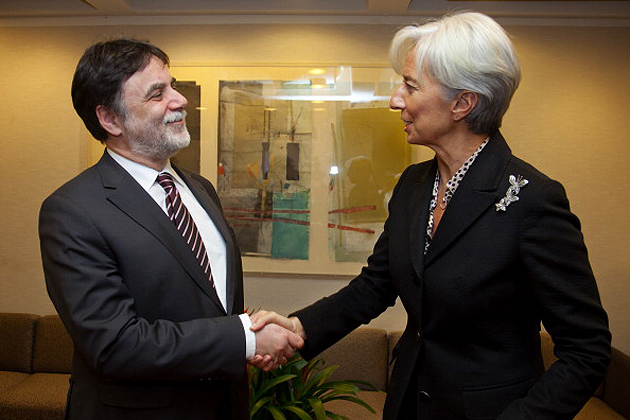Ágnes Szokolszky (’95 Ph.D.) is now head of the Psychology Department at the University of Szeged in Hungary, and her husband, Tamás L. Fellegi (’93 Ph.D.) is the chief negotiator for Hungary in fiscal talks with the European Union and the International Monetary Fund. Their son Aron, now 18, was born at Windham Hospital in Willimantic, and their second son, Benjamin, is 13. They have good memories of their graduate student days in Storrs:
Questions for Ágnes Szokolszky and Tamás Fellegi
What are you doing currently, and how did your degree at UConn help prepare you for it?

Ágnes: Since 2005, I have been head of department at the Psychology Department at the University of Szeged. Szeged is the second largest university in Hungary. The Psychology Department is a prosperous unit; we have programs in cognitive science, school psychology, personality, developmental, and health psychology. As we have been growing a lot in the past years, there have been many organizational changes. All this keeps me busy.
My Ph.D. degree that I earned at UConn in 1995 was absolutely instrumental in my career. When we came back from UConn, there were not too many people who had a degree from a university in the U.S. I had an excellent background with my degree, and it helped me a lot in my career.

Tamás: Currently, I serve in the Hungarian government as a minister in charge of international financial matters, with a special focus on the International Monetary Fund and the European Union. In this capacity, I am Hungary’s chief negotiator for international financial assistance, involving institutions like the IMF and the EU. Previously, I was the Minister for National Development. Before joining politics in 2010, I spent almost 17 years in business in different capacities, from senior executive to entrepreneur. To study and live in the U.S. was the most important element of my career, preparing me for both business and politics. The way of thinking and my attitudes toward problem-solving have a lot to do with my time in the U.S.
What do you remember most about being a student here?
Ágnes: Let’s see: Classes (and exams!) with Michael Turvey, the stat class with Len Katz, the apple salesroom, the fantastic library (in 1987, coming from a country where journals were not easily available, the library was Heaven), the tennis courts and the swimming pool, long walks at the barns, having lunch at Jonathan’s, nice evenings at the International House (where I also worked in summers), many, many nice people, I could just go on and on. …
Tamás: Well, I still have fond memories of my professors, like Rudy Tokes, Henry Krisch, and John Rourke. I remember, having just arrived from Hungary, my first appearance as a TA [teaching assistant] in front of a huge number of undergrads. Honestly, in the 1980s, coming from Eastern Europe, it was my student life in Storrs when I learned to work hard, including long, long hours at night and during weekends.
Were there any courses or faculty here that particularly influenced you?
Ágnes: I give a lot of thanks to John Rickards, who was my adviser. I was greatly influenced by Michael Turvey and Bob Shaw, whose courses on ecological psychology gave me food for thought for a whole life. Finally, I was greatly influenced by Cathy Dent-Read, who was a visiting scholar at that time in the department.
Tamás: Yes, I’d mention three people [faculty] in particular: Rudy Tokes, Henry Krisch, and Ernie Zirakzadeh.
Where did you live in Storrs, and do you keep up with friends here?
Ágnes: Actually, we moved eight times during our seven years at UConn – we lived all around, but finally spent some three years at Northwood Apartments. We had a lot of friends, and some of them visited us in Hungary later. Unfortunately, keeping up with friends has become less intensive in the past years.
Tamás: Well, we moved many times during the almost seven years there, from Willington to Ashford. The longest period of time we spent at Northwood Apartments.
Do you have children, and will they study in the U.S.?
Ágnes: Our elder son, Aron, was born there, at Windham Hospital. Now he is 18 and plans to go to law school in Hungary. However, we definitely would like him to study abroad later on – as a U.S. citizen, it seems to be a natural option for him to study in the U.S. Our second son, Benjamin, is 13. He is very fond of his brother and often will follow in his footsteps, so we will see.
Tamás: As a matter of principle, both my wife and I push our kids to go abroad, and our first choice is the U.S.
Do you have any other stories to share about UConn?
Ágnes: Those years at UConn were beautiful times for us; we spent an outstanding part of our lives there. Living in the U.S. was a fundamental experience without which we would not be what we are today. Actually, we are planning a family trip to the U.S. this summer and, of course, we would like to visit Storrs. That would give us an occasion to tell stories.
Something else I should mention – two of my previous MA students from Szeged are currently doing their Ph.D.’s at UConn, in the Department of Psychology where I got my degree. They are a couple, Zsolt and Kinga Palatinus. I am very proud of them! It is my effort to help my best students get into Ph.D. programs in the U.S., but of course, having them at UConn is especially dear to my heart.


